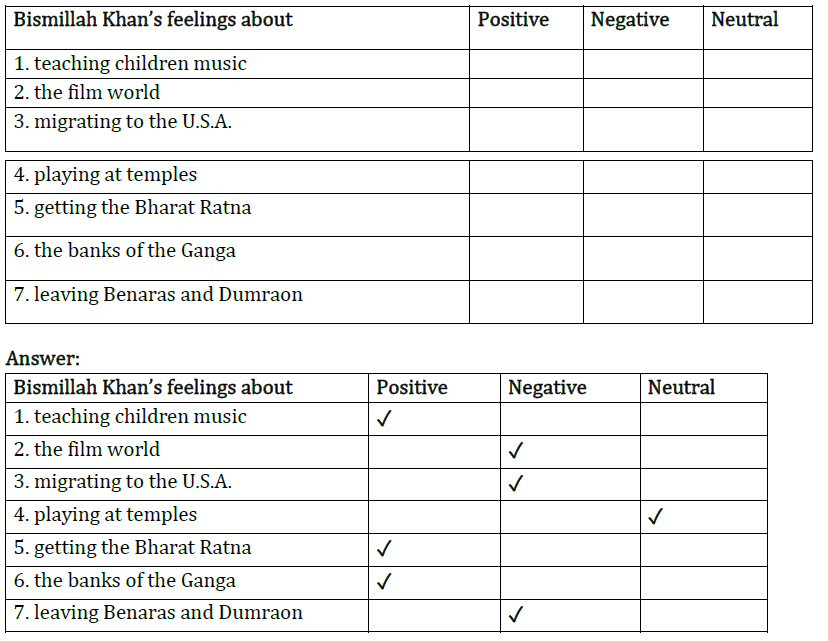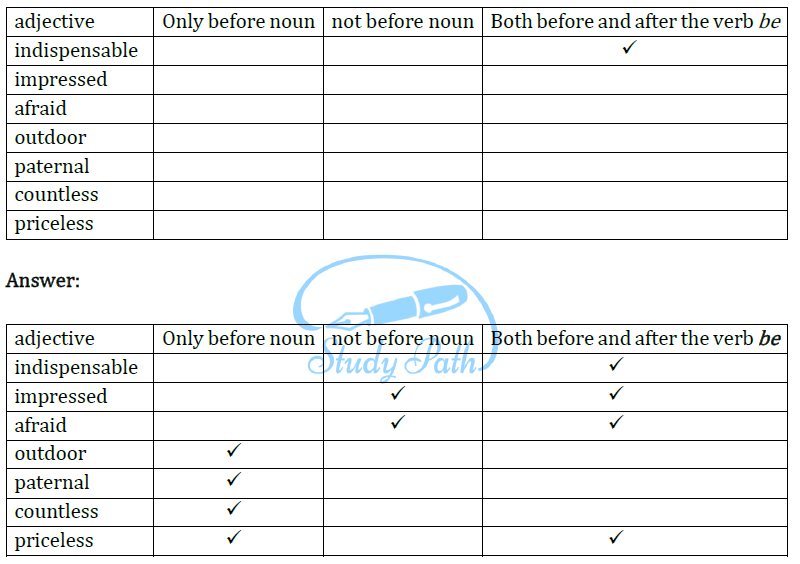NCERT Solutions for Class 9 English Beehive Chapter 2 The Sound of Music
NCERT Solutions for Class 9 English Beehive Chapter 2 The Sound of Music are given below. This chapter contains many questions that are essential for exams. Our expert teachers answered all the questions with a detailed explanation that help students to complete their assignments and homework. We have also provided NCERT Solutions for Class 9 English Chapter 2 The Sound of Music in PDF format so that you can download them for offline use.
The Sound of Music NCERT Questions and Answers
Part I
Evelyn Glennie
Thinking about the text
I. Answer these questions in a few words or a couple of sentences each.
Question 1. How old was Evelyn when she went to the Royal Academy of Music?
Answer: Evelyn was seventeen years old when she went to the Royal Academy of Music in London.
Question 2. When was her deafness first noticed? When was it confirmed?
Answer: Her deafness was first noticed when she was just eight years old. It was confirmed by the time she was eleven.
II. Answer each of these questions in a short paragraph (30–40 words).
Question 1. Who helped her to continue with music? What did he do and say?
Answer: Ron Forbes who was a percussionist, helped her to continue with music. He asked Evelyn not to listen through ears but to try to sense it some other way.
Question 2. Name the various places and causes for which Evelyn performs.
Answer: Evelyn, with a hectic international schedule, gives solo performances at regular concerts. Apart from these, she gives free concerts in prisons and hospitals. She also accords high priority to classes for young musicians.
III. Answer the question in two or three paragraphs (100–150 words).
Question 1. How does Evelyn hear music?
Answer: Evelyn heard music by sensing the notes in different parts of her body. When Ron Forbes tuned two drums to different notes and asked her to sense the sound without using her ears, she realized that she could feel the higher drum from the waist up and the lower drum from the waist down. She learnt how to open her mind and body to sounds and vibrations. It was sheer determination and hard work. When she played the xylophone, she could sense the sound passing up the stick into her fingertips. By leaning against the drums, she could feel the resonances flowing into her body. On a wooden platform, she removed her shoes so that the vibrations could pass through her bare feet and up her legs. She herself said that music poured in through every part of her body. It tingles in the skin, her cheekbones and even in her hair.
Part II
The Shehnai of Bismillah Khan
Thinking about the text
I. Tick the right answer.
1. The (shehnai, pungi ) was a ‘reeded noisemaker.’
2. (Bismillah Khan, A barber, Ali Bux) transformed the pungi into a shehnai.
3. Bismillah Khan’s paternal ancestors were (barbers, professional musicians).
4. Bismillah Khan learnt to play the shehnai from (Ali Bux, Paigambar Bux, Ustad Faiyaaz Khan).
5. Bismillah Khan’s first trip abroad was to (Afghanistan, U.S.A., Canada).
Answer:
Answer: 1. The pungi was a ‘reeded noisemaker.’
2. A barber transformed the pungi into a shehnai.
3. Bismillah Khan’s paternal ancestors were professional musicians.
4. Bismillah Khan learnt to play the shehnai from Ali Bux.
5. Bismillah Khan’s first trip abroad was to Afghanistan.
II. Find the words in the text which show Ustad Bismillah Khan’s feelings about the items listed below. Then mark a tick (✓) in the correct column. Discuss your answers in class.

III. Answer these questions in 30–40 words.
Question 1. Why did Aurangzeb ban the playing of the pungi?
Answer: Aurangzeb banned the playing of the pungi because of the shrill unpleasant sound of the instrument.
Question 2. How is a shehnai different from a pungi?
Answer: Shehnai has a better tonal quality than pungi. It is a natural hollow stem pipe with holes on its body and is longer and broader than the pungi. Shehnai is, in a way, an improvement upon the pungi.
Question 3. Where was the shehnai played traditionally? How did Bismillah Khan change this?
Answer: The shehnai was traditionally played in royal courts, temples and weddings. Ustaad Bismillah khan, an undisputed monarch of shehnai brought this instrument onto the classical stage.
Question 4. When and how did Bismillah Khan get his big break?
Answer: Bismillah khan got his big break in 1938. The All India Radio opened in Lucknow and Bismillah khan played shehnai on radio. He soon became an often heard player on radio. He became the first Indian to greet the nation with his shehnai from the Red Fort on 15 August, 1947.
Question 5. Where did Bismillah Khan play the shehnai on 15 August 1947? Why was the event historic?
Answer: Bismillah Khan played the shehnai from the Red Fort on 15th August 1947. He was the first Indian to greet the nation with his Shehnai. The event was historic because that is the day when India got independence. Bismillah Khan played Raag Kafi to an audience that included Pandit Jawaharlal Nehru.
Question 6. Why did Bismillah Khan refuse to start a shehnai school in the U.S.A.?
Answer: Bismillah Khan refused to start a shehnai school in the U.S.A because he did not want to leave his country. He felt an unbreakable bond with his towns- Dumraon and Benaras, and with River Ganga.
Question 7. Find at least two instances in the text which tell you that Bismillah Khan loves India and Benaras.
Answer: The first instance is when he turned down his student’s offer to start a shehnai school in U.S.A. The second instance is when Khansaab was asked by Shekhar Gupta about moving to Pakistan during the partition, he said that he would never leave Benaras.
Thinking about language
I. Complete the following sentences. Beginning with a toverb, try to answer the questions in brackets.
1. The school sports team hopes (What does it hope to do?)
2. We all want (What do we all want to do?)
3. They advised the hearing-impaired child’s mother (What did they advise her to do?)
4. The authorities permitted us to (What did the authorities permit us to do?)
5. A musician decided to (What did the musician decide to do?)
Answer: 1. The school sports team hopes to win the competition.
2. We all want to succeed in our lives.
3. They advised the hearing-impaired child’s mother to take care of the child.
4. The authorities permitted us to perform the dance in the stadium.
5. A musician decided to play the music in front of the audience.
II. From the text on Bismillah Khan, find the words and phrases that match these definitions and write them down. The number of the paragraph where you will find the words/phrases has been given for you in brackets.
1. the home of royal people (1) ________
2. the state of being alone (5) ________
3. a part which is absolutely necessary (2) ________
4. to do something not done before (5) ________
5. without much effort (13) ________
6. quickly and in large quantities (9) ________ and ________
Answer: 1. the home of royal people (1) royal residence
2. the state of being alone (5) solitude
3. a part which is absolutely necessary (2) indispensable
4. to do something not done before (5) invent
5. without much effort (13) effortlessly
6. quickly and in large quantities (9) thick and fast
III. Tick the right answer.
1. The school sports team hopes ______ (What does it hope to do?)
2. We all want ______ (What do we all want to do?)
3. They advised the hearing-impaired child’s mother ______ (What did they advise her to do?)
4. The authorities permitted us to ________ (What did the authorities permit us to do?)
5. A musician decided to ________ (What did the musician decide to do?)
Answer:
1. The school sports team hopes to win the competition.
2. We all want to succeed in our lives.
3. They advised the hearing-impaired child’s mother to take care of the child.
4. The authorities permitted us to perform the dance in the stadium.
5. A musician decided to play the music in front of the audience.
IV. Consult your dictionary and complete the following table. The first one has been done for you.

Use these words in phrases or sentences of your own.
Some sentences using these adjectives are:
Indispensable: Electronic gadgets have become indispensable to modern life.
Impressed: He was impressed by his friend’s speech.
Afraid: Raghav is afraid of dark.
Outdoor: Outdoor games are necessary for keeping yourself healthy.
Paternal: My paternal uncle lives in Mumbai.
Countless: There are countless stars in the sky.
Priceless: Children’s smiles are priceless.
Speaking
I. Imagine the famous singer Kishori Amonkar is going to visit your school. You have been asked to introduce her to the audience before her performance. How would you introduce her?
Answer: Do it yourself.
II. Use your notes on Kishori Amonkar to introduce her to an imaginary audience.
You may use one of the following phrases to introduce a guest:
I am honoured to introduce…/I feel privileged to introduce…/We welcome you…
Answer: I am honoured to introduce you to the finest female vocalist of her generation, Kishori Amonkar. She is a Padma Bhushan awardee who was born in 1931 to another great artist Smt. Mogubai Kurdikar. She is a singer besotted by the mysterious world of the raagas. She dissects them until the most subtle of shades emerge and re-emerge. She is highly inspired by the teachings of the Vedic sages. She has been bestowed with several significant awards – Sangeet Natak Akademi Award (1985), the Padma Bhushan (1987), and one of the most prestigious awards in Indian Classical Music- Sangeet Samradhini Award (1997).
Writing
I. “If you work hard and know where you’re going, you’ll get there,” says Evelyn Glennie.
You have now read about two musicians, Evelyn Glennie and Ustad Bismillah Khan. Do you think that they both worked hard? Where did they want to ‘go’?
Answer these questions in two paragraphs, one on each of the two musicians.
Answer: Yes, they both worked extremely hard. They wanted to pursue music as their career and achieve heights.
Evelyn Glennie is an inspiration to everyone. She grew profoundly deaf by the time she was eleven years old. But, she did not let the disability to listen become a hurdle in pursuing her career in music. She auditioned in Royal Academy of Music in London when she was not even seventeen years old and scored one of the highest marks in the history of the academy. In a field like music that’s entirely linked to listening, she began to sense music through different parts of her body. She brought percussion to the front of the orchestra. She was awarded with the Royal Philharmonic Society’s Soloist of the Year Award in the year 1991. She inspires people with her life and optimism.
Ustad Bismillah Khan belonged to a family of professional musicians. Shehnai was being used in temples and marriages, but the credit of bringing shehnai onto the classical stage goes to Ustad Bismillah Khan. He took to music in early years of his life. At the age of three, he was quite fascinated watching his uncles playing the shehnai. On the day of independence of India, he was the first Indian to greet the nation with his shehnai. He was strongly bonded to Benaras and the holy Ganga. He was awarded India’s highest civilian award- Bharat Ratna.